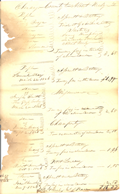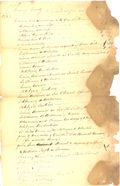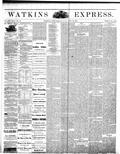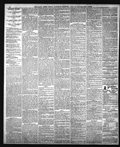Trial of 1826
|
|
|
Judge Neely's Court Notes
|
|
Fraser's Magazine
|
|
1873
|
State of New York v. Joseph Smith.
Warrant issued upon written complaint upon oath of Peter G. Bridgeman, who informed that one Joseph Smith of Bainbridge was a disorderly person and an impostor.
Prisoner brought before Court March 20, 1826. Prisoner examined: says that he came from the town of Palmyra, and had been at the house of Josiah Stowel in Bainbridge most of time since; had small part of time been employed in looking for mines, but the major part had been employed by said Stowel on his farm, and going to school. That he had a certain stone which he had occasionally looked at to determine where hidden treasures in the bowels of the earth were; that he professed to tell in this manner where gold mines were a distance under ground, and had looked for Mr. Stowel several times, and had informed him where he could find these treasures, and Mr. Stowel had been engaged in digging for them. That at Palmyra he pretended to tell by looking at this stone where coined money was buried in Pennsylvania, and while at Palmyra had frequently ascertained in that way where lost property was of various kinds; that he had occasionally been in the habit of looking through this stone to find lost property for three years, but of late had pretty much given it up on account of its injuring his health, especially his eyes, making them sore; that he did not solicit business of this kind, and had always rather declined having anything to do with this business.
Josiah Stowel sworn: says that prisoner had been at his house something like five months; had been employed by him to work on farm part of time; that he pretended to have skill of telling where hidden treasures in the earth were by means of looking through a certain stone; that prisoner had looked for him sometimes; once to tell him about money buried in Bend Mountain in Pennsylvania, once for gold on Monument Hill, and once for a salt spring; and that he positively knew that the prisoner could tell, and did possess the art of seeing those valuable treasures through the medium of said stone; that he found the [word illegible] at Bend and Monument Hill as prisoner represented it; that prisoner had looked through said stone for Deacon Attleton for a mine, did not exactly find it, but got a p-[word unfinished] of ore which resembled gold, he thinks; that prisoner had told by means of this stone where a Mr. Bacon had buried money; that he and prisoner had been in search of it; that prisoner had said it was in a certain root of a stump five feet from the surface of the earth, and with it would be found a tail feather; that said Stowel and prisoner thereupon commenced digging, found a tail feather, but money was gone; that he supposed the money moved down. That prisoner did offer his services; that he never deceived him; that prisoner looked through stone and described Josiah Stowel's house and outhouses, while at Palmyra at Simpson Stowel's, correctly; that he had told about a painted tree, with a man's head painted upon it, by means of said stone. That he had been in company with prisoner digging for gold, and had the most implicit faith in prisoner's skill.
Arad Stowel sworn: says that he went to see whether prisoner could convince him that he possessed the skill he professed to have, upon which prisoner laid a book upon a white cloth, and proposed looking through another stone which was white and transparent, hold the stone to the candle, turn his head to book, and read. The deception appeared so palpable that witness went off disgusted.
McMaster sworn: says he went with Arad Stowel, and likewise came away disgusted. Prisoner pretended to him that he could discover objects at a distance by holding this white stone to the sun or candle; that prisoner rather declined looking into a hat at his dark coloured stone, as he said that it hurt his eyes.
Jonathan Thompson says that prisoner was requested to look for chest of money; did look, and pretended to know where it was; and that prisoner, Thompson, and Yeomans went in search of it; that Smith arrived at spot first; was at night; that Smith looked in hat while there, and when very dark, and told how the chest was situated. After digging several feet, struck upon something sounding like a board or plank. Prisoner would not look again, pretending that he was alarmed on account of the circumstances relating to the trunk being buried, [which] came all fresh to his mind. That the last time he looked he discovered distinctly the two Indians who buried the trunk, that a quarrel ensued between them, and that one of said Indians was killed by the other, and thrown into the hole beside the trunk, to guard it, as he supposed. Thompson says that he believes in the prisoner's professed skill; that the board which he struck his spade upon was probably the chest, but on account of an enchantment the trunk kept settling away from under them when digging; that notwithstanding they continued constantly removing the dirt, yet the trunk kept about the same distance from them. Says prisoner said that it appeared to him that salt might be found at Bainbridge, and that he is certain that prisoner can divine things by means of said stone. That as evidence of the fact prisoner looked into his hat to tell him about some money witness lost sixteen years ago, and that he described the man that witness supposed had taken it, and the disposition of the money:
And therefore the Court find the Defendant guilty. Costs: Warrant, 19c. Ccomplaint upon oath, 25 1/2c. Seven witnesses, 87 1/2c. Recognisances, 25c. Mittimus, 19c. Recognisances of witnesses, 75c. Subpoena, 18c. - $2.68 |
|
|
|
(Note:
This account claimed to have originated from a document in the possession of Ms. Emily Pearsall. According to her Episcopalian bishop, Daniel S. Tuttle, she tore this "examination" from Judge Neely's docket book, Judge Neely being her uncle, and brought it from Bainbridge to Salt Lake City in 1870. After her death on November 5, 1872, Tuttle inherited the document, then later gave it to the Methodists, after which it was lost. Fraser's Magazine contained the first of four publications reproducing its contents before it was lost. The other accounts are the Eclectic Magazine, the Schaff-Herzog Encyclopedia, and the Utah Christian Advocate (the latter two with a number of textual differences from the first two).)
|
|
|
|

|
|
External Link
|
|
Trial Bill of Albert Neely, 20 March 1826 [People v. Smith, 1826], The Joseph Smith Papers
|
|
|
|
|
Justice Albert Neely's bill
|
|
20 Mar, 1826
|
Same
vs
Joseph Smith
The Glass Looker
March 20, 1826
Misdemeanor
To my fees in examination of the above cause $2.68 |
|
|
|

|
|
External Link
|
|
Trial Bill of Philip M. De Zeng, 1826 [People v. Smith, 1826], The Joseph Smith Papers
|
|
|
|
|
Constable Philip De Zeng's bill
|
|
20 Mar, 1826
|
Serving warrant on Joseph Smith of...
Subpoening 12 witnesses & travel
attendance with Prisoner two days & 1 night
Notifying two justices
10 miles travel with mittimus to take him
|
|
|
|
|
|
|
Report in Evangelical Magazine and Gospel Advocate
|
|
Abraham W. Benton
|
|
Mar, 1831
|
|
At length the public, becoming wearied with the base imposition which he was palming upon the credulity of the ignorant, for the purpose of sponging his living from their earnings, had him arrested as a disorderly person, tried and condemned before a court of Justice. But, considering his youth, (he then being a minor,) and thinking he might reform his conduct, he was designedly allowed to escape. This was four or five years ago. |
|
|
|
(Note:
A vague recollection in 1904 of the trial can be read here.)
|
|
|
|
|
|
|
Josiah Stowell in an 1830 Trial
|
|
New England Christian Herald
|
|
7 Nov, 1832
|
The defendant was brought before me by virtue of a warrant on the 30th day of June, A. D. 1830...
Josiah Stowel, being by me sworn,... says that about three years since, prisoner was put under arrest by an officer at Bainbridge in Chenango county, for breaking the peace, and that he escaped from the officer and went to Palmyra;... and that prisoner told witness after he was arrested in Bainbridge, he would not look for money, &c. any more; |
|
|
|
(Note:
This was originally published in the New England Christian Herald. No images of this periodical are available online, but a transcript can be read here. It was reprinted 9 days later in the Morning Star (Limerick, Maine) vol 7, no. 20 which can be viewed here)
|
|
|
|
|
|
|
Oliver Cowdery account in the Messenger and Advocate
|
|
Oliver Cowdery
|
|
Oct, 1835
|
|
While employed here he became acquainted with the family of Isaac Hale... while in that country, some very officious person complained of him as a disorderly person, and brought him before the authorities of the country; but there being no cause of action he was honorably acquited. |
|
|
|
![Jo. engaged the attention of a few indiv[iduals] Given to the marvelous Duge for money Salt Iron Oar Golden Oar Silver Oar and almost any thing every thing until Civil authority brought up Jo. standing (as the Boys say) under the Vagrant act Jo. was condemned whisper came to Jo. off off - took Leg Bail (or gave Leg Bail) all things straight: Jo. was not seen in our town for - 2 years or more](images/1842nobl_thumb.jpg)
|
|
External Link
|
|
Image courtesy of Illinois Historical Society, via olivercowdery.com
|
|
|
|
|
Letter from Joel Noble
|
|
Joel King Noble
|
|
8 Mar, 1842
|
|
Jo. engaged the attention of a few indiv[iduals] Given to the marvelous Duge for money Salt Iron Oar Golden Oar Silver Oar and almost any thing every thing until Civil authority brought up Jo. standing (as the Boys say) under the Vagrant act Jo. was condemned whisper came to Jo. off off - took Leg Bail (or gave Leg Bail) all things straight: Jo. was not seen in our town for - 2 years or more |
|
|
|

|
|
External Link
|
|
Chenango Union, Norwich, NY, May 2, 1877, Vol 30, No. 33
|
|
|
|
|
W. D. Purple account
|
|
W. D. Purple
|
|
2 May, 1877
|
In February 1826, the sons of Mr. Stowell, who lived with their father, were greatly incensed against Smith, as they plainly saw their father squandering his property in the fruitless search for hidden treasures, and saw that the youthful seer had unlimited control over the illusions of their sire. They made up their minds that "patience had ceased to a virtue," and resolved to rid themselves and their family from this incubus, who, as they believed, was eating up their substance, and depriving them of their anticipated patrimony. They caused the arrest of Smith as a vagrant, without visible means of livelihood. The trial came on in the above mentioned month, before Albert Neeley, Esq., the father of Bishop Neeley, of the State of Maine. I was an intimate friend of the Justice, and was invited to take notes of the trial, which I did. There was a large collection of persons in attendance, and the proceedings attracted much attention.
The affidavits of the sons were read, and Mr. Smith was fully examined by the Court. It elicited little but a history of his life from early boyhood, but this is so unique in character, and so much of a key-note to his subsequent career in the world, I am tempted to give it somewhat in entenso. He said when he was a lad, he heard of a neighboring girl some three miles from him, who could look into a glass and see anything however hidden from others; that he was seized with a strong desire to see her and her glass; that after much effort he induced his parents to let him visit her. He did so, and was permitted to look in the glass, which was placed in a hat to exclude the light. He was greatly surprised to see but one thing, which was a small stone, a great way off. It soon became luminous, and dazzled his eyes, and after a short time it became as intense as the mid-day sun. He said that the stone was under the roots of a tree or shrub as large as his arm, situated about a mile up a small stream that puts in on the South side of Lake Erie, not far from the Now York and Pennsylvania line. He often had an opportunity to look in the glass, and with the same result. The luminous stone alone attracted his attention. This singular circumstance occupied his mind for some years, when he left his father's house, and with his youthful zeal traveled west in search of this luminous stone.
He took a few shillings in money and some provisions with him. He stopped on the road with a farmer, and worked three days, and replenished his means of support. After traveling some one hundred and fifty miles he found himself at the mouth of the creek. He did not have the glass with him, but he knew its exact location. He borrowed an old ax and a hoe, and repaired to the tree. With some labor and exertion he found the stone, carried it to the creek, washed and wiped it dry, sat down on the bank, placed it in his hat, and discovered that time, place and distance were annihilated; that all intervening obstacles were removed, and that he possessed one of the attributes of Deity, an All-Seeing-Eye. He arose with a thankful heart, carried his tools to their owner, turned his feet towards the rising sun, and sought with weary limbs his long deserted home.
On the request of the Court, he exhibited the stone. It was about the size of a small hen' a egg, in the shape of a high-instepped shoe. It was composed of layers of different colors passing diagonally through it. It was very hard and smooth, perhaps by being carried in the pocket.
Joseph Smith, Sr., was present, and sworn as a witness. He confirmed, at great length all that his son had said in his examination. He delineated his characteristics in his youthful days -- his vision of the luminous stone in the glass -- his visit to Lake Erie in search of the stone -- and his wonderful triumphs as a seer. He described very many instances of his finding hidden and stolen goods. He swore that both he and his son were mortified that this wonderful power which God had so miraculously given him should be used only in search of filthy lucre, or its equivalent in earthly treasures, and with a long-faced, "sanctimonious seeming," he said his constant prayer to his Heavenly Father was to manifest His will concerning this marvelous power. He trusted that the Son of Righteousness would some day illumine the heart of the boy, and enable him to see His will concerning him. These words have ever had a strong impression on my mind. They seemed to contain a prophetic vision of the future history of that mighty delusion of the present century, Mormonism. The "old man eloquent," with his lank and haggard vissage -- his form very poorly clad -- indicating a wandering vagabond rather than an oracle of future events, has, in view of those events, excited my wonder, if not my admiration.
The next witness called was Deacon Isaiah Stowell. He confirmed all that is said above in relation to himself, and delineated many other circumstances not necessary to record. He swore that the prisoner possessed all the power he claimed, and declared he could see things fifty feet below the surface of the earth, as plain as the witness could see what was on the Justices' table, and described very many circumstances to confirm his words. Justice Neeley soberly looked at the witness, and in a solemn, dignified voice said: "Deacon Stowell, do I understand you as swearing before God, under the solemn oath you have taken, that you believe the prisoner can see by the aid of the stone fifty feet below the surface of the earth; as plainly as you can see what is on my table?" "Do I believe it?" says Deacon Stowell; "do I believe it? No, it is not a matter of belief: I positively know it to be true."
Mr. Thompson, an employee of Mr. Stowell, was the next witness. He and another man were employed in digging for treasure, and always attended the Deacon and Smith in their nocturnal labors. He could not assert that anything of value was ever obtained by them. The following scene was described by this witness, and carefully noted: Smith had told the Deacon that very many years before a band of robbers had buried on his flat a box of treasure, and as it was very valuable they had by a sacrifice placed a charm over it to protect it, so that it could not be obtained except by faith, accompanied by certain talismanic influences. So, after arming themselves with fasting and prayer, they sallied forth to the spot designated by Smith. Digging was commenced with fear and trembling, in the presence of this imaginary charm. In a few feet from the surface the box of treasure was struck by the shovel. on which they redoubled their energies, but it gradually receded from their grasp. One of the men placed his hand upon the box, but it gradually sunk from his reach, After some five feet in depth had been attained without success, a council of war, against this spirit of darkness was called, and they resolved that the lack of faith, or of some untoward mental emotions was the cause of their failure.
In this emergency the fruitful mind of Smith was called on to devise a way to obtain the prize. Mr. Stowell went to his flock and selected a fine vigorous lamb, and resolved to sacrifice it to the demon spirit who guarded the coveted treasure. Shortly after the venerable Deacon might be seen on his knees at prayer near the pit, while Smith, with a lantern in one hand to dispel the midnight darkness, might be seen making a circuit around the spot, sprinkling the flowing blood from the lamb upon the ground, as a propitiation to the spirit that thwarted them. They then descended the excavation, but the treasure still receded from their grasp, and it was never obtained.
...These scenes occurred some four years before Smith, by the aid of his luminous stone, found the Golden Bible, or the Book of Mormon. The writer may at some subsequent day give your readers a chapter on its discovery, and a synopsis of its contents. It is hardly necessary to say that, as the testimony of Deacon Stowell could not be impeached, the prisoner was discharged, and in a few weeks left the town. |
|
|
|
(Note:
No images of this edition of the Chenango Union are available online. On July 26, 1877, this article was reprinted in the Watkins Express and can be read in its original format here.)
|
|
|
|

|
|
External Link
|
|
The Daily Inter Ocean, Chicago, IL, 30 Jul, 1881, Vol 10, No 107
|
|
|
|
|
Ariel McMaster Account
|
|
Ariel McMaster
|
|
16 Jul, 1881
|
Things went on in this Way till many people were influenced, and not a little excitement was raised. It was at first laughed about, but finally the better class of people thought that Smith had done enough and had better be driven out of the neighborhood. Peter G. Bridgman, a young man then just about to enter the Methodist ministry, entered a complaint before a magistrate against Smith for deceiving the people. He was arrested and tried. Stowell appeared as a witness for the defendant. He thought to clear his friend by testifying to all the facts in the case, and laid before the court the fraud, deception, and chicanery of Smith. Never did lawyers, court, constables, and the usual crowd that gathers around a country tavern and lawsuit, have a greater scene of merriment than that afternoon. It was related to the writer by one who was there as beyond all description. Smith was found guilty.
But the object of the trial being to compel him to leave the neighborhood, it was arranged that the officer in charge should give him a chance to escape. His counsel having whispered this in his ear, he embraced the opportunity given, and with the best strides his long legs could make he betook himself across the fields to the woods, all the crowd roaring with laughter to see the great prophet run. This ended his work in Chenango County. He went into Pennsylvania, and afterward returned to Broome County, New York, where he was again arrested and came near being treated to a coat of tar and feathers. While there he was in possession of "Manuscript Found," or some part of it. This was in the year 1826 or 1827, and before he had met Sidney Rigdon.
|
|
|
|
(Note:
Reverend Ariel McMaster was born in 1832 and thus could not have attended the trial. In 1974 Reverend Wesley Walters identified the witness named McMaster in the Judge Neely court notes as Ariel's grandfather, David McMaster, who would have been approximately 51 at the time of the trial. Reverend Ariel McMaster was also the nephew of Peter G. Bridgeman on his mother's side. Peter Bridgeman was in turn the nephew of Josiah Stowell's wife.)
|
|
|
|
|